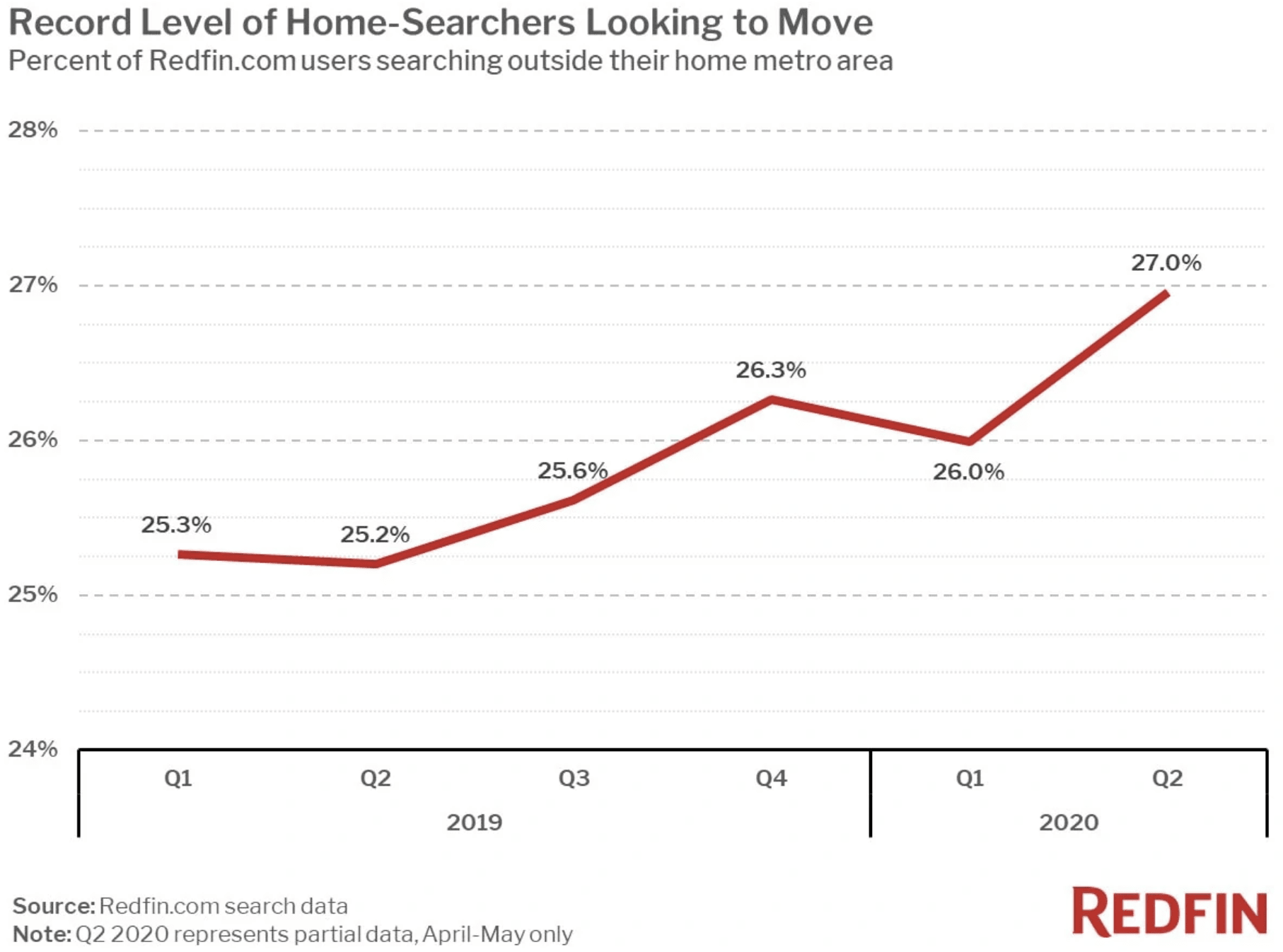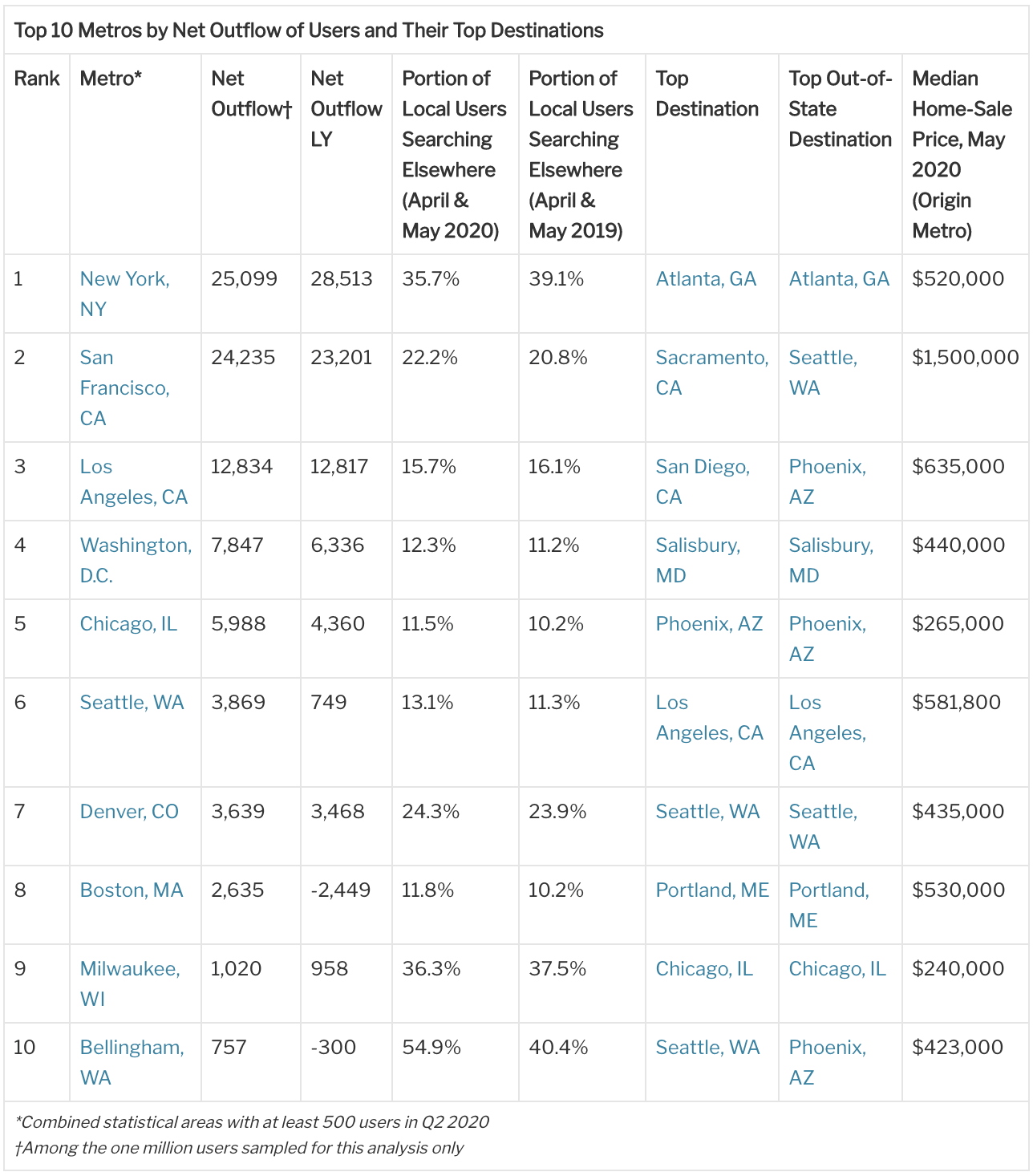27% OF HOMEBUYERS LOOK TO RELOCATE TO LESS DENSE, MORE AFFORDABLE AREAS
Real Estate

Real Estate

A record high of 27 percent of home shoppers searched for homes in a different metro area than the one they live in during April and May 2020, according to a new report from technology-powered brokerage Redfin.
Previously, the percentage of Redfin.com users searching for homes outside of their metro area had reached 25.2 percent in Q2 2019 and 26 percent in Q1 2020.

Redfin analyzed over 1 million Redfin.com users who reviewed homes on the site across 87 metro areas during April and May, and excluded searches that were unlikely to precede a relocation or home purchase. To be included in the study, users had to have viewed at least 10 homes in one metro area, and homes in that area must have made up at least 80 percent of the user’s searches.
The trend is not new, as studies over the past few months have shown secondary cities gaining in popularity for homebuyers, as well as less densely populated locales getting increased traffic on vacation rental sites like Airbnb. Redfin page views of listings in towns with less than 50,000 residents were up by 87 percent year over year in May, and conversely, page views in towns with over 1 million residents were up by only 22 percent year over year.
“While there has been a huge increase in the number of people looking online at homes in small towns, the long-term impact of the pandemic on people actually moving from one part of the country to another remains to be seen,” Taylor Marr, Redfin economist, said in a statement. “People are starting to take the plunge and move away from big, expensive cities, though most of them were probably already considering a lifestyle change.”

Among large metro areas, New York, San Francisco and Los Angeles had the biggest net outflow (more people looking to leave than move into) of Redfin.com users during April and May. San Francisco, Washington, D.C., Chicago, Seattle, Denver and Boston have all seen slight increases of less than 2 percent in the share of people looking to move away compared to one year ago.
Phoenix, Sacramento and Las Vegas — metros with lower costs of living — experienced the greatest net inflow of Redfin.com users during April and May. Home searchers looking to leave more expensive coastal areas of California are a main source of interest in these three metro areas, as well as Austin and Dallas. A sizable 35.2 percent of home shoppers looking at properties in Las Vegas were from Los Angeles. Similarly, 22.7 percent of home searchers looking in Phoenix and 14.1 home searchers looking at homes in Dallas were from Los Angeles.
Likewise, San Francisco Bay Area residents are flocking to Sacramento and Austin, with 72.4 percent and 17.3 percent of home searches for those areas, respectively, originating in San Francisco.
“Most of the homebuyers I meet are moving into town from other places because Sacramento gives them the best bang for their buck,” Kellee Davis, a Sacramento-based Redfin agent, said in Redfin’s report. “In the Bay Area, the size, quality and land that comes with properties don’t come close to what they can get for moving just an hour and a half away.”
It’s unclear whether or not the new high in home searches outside of one’s own metro area may be an indication of the trend’s lasting power. As Marr suggested, for now, it may be more of an escape mechanism for fatigued quarantiners than a precursor to actual migration.
“The pandemic and the work-from-home opportunities that come with it is accelerating migration patterns that were already in place toward relatively affordable parts of the country,” Marr said. “But for many people, the lure of large homes in wide open spaces will be a passing dream fueled by coronavirus-induced isolation.”
Stay up to date on the latest real estate trends.

Discover how much equity you've gained in 2025. Learn how to use it smartly in Mountain View, Palo Alto & Los Altos. Contact Patrice Horvath today.

In this article, Patrice Horvath of Illuminate Properties breaks down the key financial advantages of buying a home before the end of 2025. From mortgage interest and … Read more

Mortgage rates are easing and buyers are re-entering the market. Read Patrice Horvath’s October 2025 Silicon Valley Market Update for the latest trends.

Home staging is key to selling your Silicon Valley home faster and for top value. Focus on curb appeal, neutral interiors, fresh paint, bright lighting, and profession… Read more

Discover the top 4 must-haves for millennial home buyers — from home offices to energy efficiency. Contact Patrice Horvath for expert Bay Area real estate advice.

As the leaves start to change and cooler evenings set in, now is the perfect time to prepare your home for fall—and boost its future value while you're at it. Whether … Read more
You’ve got questions and we can’t wait to answer them.